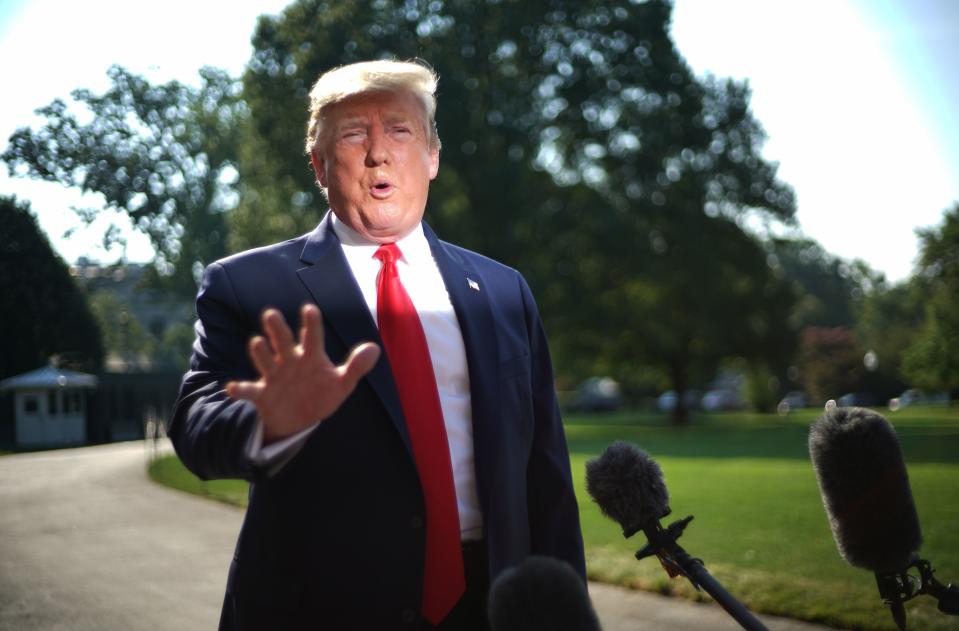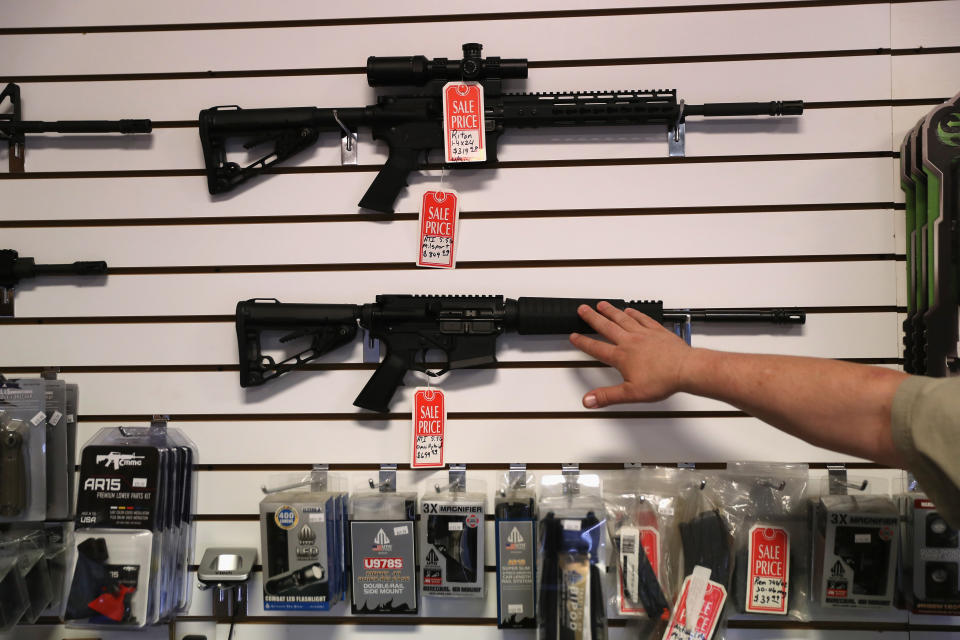Trump is — once again — 'all in favor' of background checks that he opposed in February
In the wake of the deadly mass shootings in El Paso, Texas, and Dayton, Ohio, officials are talking about giving consideration to studying stronger measures on gun control.
One of the primary suggestions put forth — including by President Trump in recent days — is an expansion of background checks for firearms purchases. In February, the Democratic-led House passed two pieces of legislation that would have done that.
The first, H.R. 8, was dubbed the Bipartisan Background Checks Act of 2019 for its five Republican co-sponsors, although it received just eight Republican votes on final passage. The legislation mandates background checks be performed on all gun sales, including those made privately via the internet or at gun shows. Under current law, only licensed gun dealers are required to conduct a background check for potential purchasers. There would still be some exceptions, including transfers between close relatives or loaning for use at a shooting range or while hunting.
The second was meant to extend the amount of time it can take for background checks to process, from three business days to 10, with a potential extension of an additional 10 days. Under current laws, if the check takes longer than three days due to incomplete data, the sale moves forward. This has been referred to as the “Charleston loophole,” as it is how Dylann Roof, who killed nine people at the Mother Emanuel AME Church in Charleston, S.C., obtained his gun.

“Well, I’m looking to do background checks,” said Trump on Wednesday. “I think background checks are important. I don’t want to put guns into the hands of mentally unstable people or people with rage or hate, sick people. I don’t want to — I’m all in favor of it.”
Trump was all in favor of background checks after the shooting at a high school in Parkland, Fla., last year, saying, “We’re going to be very strong on background checks. We’re going to be doing very strong background checks.”

Flashback: President Trump keeps lawmakers guessing at gun meeting >>>
However, Trump didn’t support either of the House bills, with the White House issuing a statement prior to their passage saying he would veto them. The measures were strongly opposed by the National Rifle Association, and Senate Majority Leader Mitch McConnell has refused to bring them up for a vote.
In 2013, following the shooting at Sandy Hook Elementary in Newtown, Conn., a bipartisan bill to expand background checks, sponsored by Sen. Pat Toomey, R-Pa., and Sen. Joe Manchin, D-W.Va., received 54 votes in the Senate, short of the 60 needed to pass, and was never voted on in the House. The Manchin-Toomey proposal failed again in 2015 after it was reintroduced after a mass shooting in San Bernardino, Calif.
Some Republican legislators have pushed for passing a “red flag” law as a response to the weekend’s shootings. The legislation would allow a judge to temporarily order the confiscation of firearms from individuals deemed dangerous by the courts after a referral from relatives, friends or law enforcement. At least 17 states currently have similar legislation, the majority passed in the year and a half since the killings in Parkland.
Senate Minority Leader Chuck Schumer said in a statement Wednesday that red flag laws weren’t an adequate response.
"The notion that passing a tepid version of an Extreme Risk Protection Order (ERPO) bill — alone — is even close to getting the job done in addressing rampant gun violence in the U.S. is wrong and would be an ineffective cop-out," Schumer said, adding, “We Democrats are not going to settle for half-measures so Republicans can feel better and try to push the issue of gun violence off to the side.”
Schumer said that if Republicans brought up a red flag bill, his caucus would push for a vote on the House bills from February, saying, “Democrats in the Senate will seek to require that any ERPO bill that comes to the floor is accompanied by a vote on the House-passed universal background checks legislation.”
Rep. Mike Turner, a Republican who represents Dayton, said earlier this week that he now supports a ban on assault-weapon-style firearms and extended magazines in addition to the red flag laws. Turner is a former mayor of Dayton, and his daughter was across the street from the shooting Saturday night. He voted against the background check bills earlier this year, and his campaign was endorsed by the NRA in 2018.
Fellow Ohio Republicans have also put forth proposals. Gov. Mike DeWine announced a plan Tuesday for universal background checks and red flag laws. Sen. Rob Portman, who voted against the Manchin-Toomey bill in 2013, has expressed support for red flag laws in the wake of the Dayton shooting.

Guns have not been a major issue in the Democratic presidential race thus far. Sen. Cory Booker, D-N.J., has put forth a plan to require a license to buy and own a gun. Rep. Eric Swalwell, D-Calif., who has dropped out of the race, proposed an assault-weapons ban combined with a mandatory buyback. Under Swalwell’s legislation, those who did not sell their guns would be prosecuted.
A study released earlier this year found that the more guns that were in a state, the more mass shootings occurred. In Missouri, a reduction in gun regulation led to an increase in deaths, while tighter regulations decreased deaths in Connecticut.
The last significant gun control measure to pass Congress was an assault-weapons ban enacted in 1994. It expired a decade later, and lawmakers did not renew it. There have been executive actions taken in an attempt to implement new gun regulations. Following pressure after the October 2017 shooting in Las Vegas, Trump’s Justice Department issued an order essentially banning bump stocks, which allow semiautomatic weapons to fire like automatics. Former President Barack Obama issued an executive order that would have restricted firearms sales to people receiving Social Security benefits for mental disability, but Trump signed legislation rolling that policy back in his first full month in office.
_____
Download the Yahoo News app to customize your experience.
Read more from Yahoo News:
FBI document warns conspiracy theories are a new domestic terrorism threat
Marianne Williamson on reparations and her emails with Oprah
'It's blasted across America': How Fox and Sean Hannity amplified a Russia-fueled conspiracy
Democrats resume search for a 'smoking gun' to bring down Trump
PHOTOS: President faces protests on visit to cities hit by mass shootings



